“You are mistaken, blind one. There is an immortal Child of Light who came into this realm before you and who will appear among your duplicate forms, in your simulated world … And in the consummation of all your works, their entire deficiency of truth will be revealed and dissolved by this Luminous Child.”
—The Aeon Sophia to the Lord Archon in ON THE ORIGIN OF THE WORLD
“You sure you’re up for this, Cali?”
“Up” was the operative word in Juice’s well-meaning question posed in his resonant bass voice. The two teenagers sat astraddle his idling, jerry-rigged motorbike way up, up, up above the Nolihana at the entrance to a seemingly endless levitrain trestle spanning the great river in cascades of gleaming steel.
Trembling, Cali stole a panicked glance down through the morning mist at the water’s mercurial eddies that seemed as far below as the pastel autumn trees on the mountainsides rose far above. Gripping Juice’s muscular midsection and breathing in his comforting natural scent, she whispered (none too convincingly), “I’m sure.”
“You sure you’re sure? It’ll take us the better part of two minutes to cross this thing. That’s assuming no mechanical malfunctions or operator errors. If a whipper or zipper shows up in either direction, there’s a good chance we’re sleeping with the fishes tonight.”
There was no fear in Juice’s voice. Fear wasn’t something Cali associated with him. He was simply speaking the hard truth: any way you sliced it, crossing the trestle toward the Badlands was a highly dangerous undertaking.
The light at the entrance was still green, but the light inside Cali’s mind remained red. Closing her eyes and breathing deeply again in an attempt to allay her terror of falling, she experienced something akin to a “life review” said to happen to those who are dying. With pristine clarity she found herself replaying the chain of events that had led her to this momentous—and possibly crazy—impasse.
There was her lovely mother for whom she was named, Caliandra Helena Crowell, “Dr. Caliandra” to her many adoring patients, treating eleven-year-old Frederick Hamilton with herb-infused juice for a potentially lethal respiratory infection—an event of such significance to his close-knit community it branded him with his catchy nickname for life.
Cali recalled this episode from five years ago, when she was ten, as if it were five weeks ago. Of particular sweetness was the memory of approaching her newly recovered friend as he sat beside the pier alongside the murmuring stream that ran below his POC shanty village checking his trotlines.
“Well, if it isn’t Frederick ‘Juice’ Hamilton,” she called out while navigating the slippery riverbank. “You’re quite the celebrity around here.”
“Well, if it isn’t Sofia Caliandra Crowell,” he replied still focused on the task at hand. “You’re quite the celebrity. Period.”
“Not Crow-well. Crowell. Rhymes with owl.”
“My mistake, Miss Cali.”
“Cut the plantation talk, Juice. It’s me.”
“What for? This is the plantation.”
Cali had met “Fred” just before he became ill while accompanying her mother on rounds through the Hinterlands. She’d held his hand through many a delirious hour when his fever made him talk circles in some bizarre, singsongy language she didn’t understand and he didn’t remember upon returning to his senses.
Though a natural attraction existed between the two youngsters, one neither was capable of understanding in the formative days of their connection, they were—as the old saying goes—like an apple and an orange.
That afternoon, as a case in point, Cali sported an emerald designer petticoat and matching heels (now sadly caked with mud), while Juice wore frayed jeans, a faded blue T-shirt with holes in it, and no shoes at all. She was recently coiffed; his proliferating afro suggested clippers had never so much as approached his shapely head.
Even at such a young age, she remarked like the city girl she was while marveling at how deftly he unhooked and basketed his haul of whiskered catfish, he could have been a male caryatid carved out of marble guarding the entrance to some grandiose edifice of great importance to the Fatherland. Except, of course, that he was a person of color.
“You like raw catfish?” he asked with a broad grin and a mischievous glimmer in his hazel eyes.
“Never tried it. Sounds disgusting.”
Juice tried but failed to stifle his laughter. “I was just pulling your leg. Nobody eats catfish raw. Unless they’re desperate.”
“I don’t think I’ve even tried cooked catfish. Does it taste anything like mahi-mahi?”
“What’s mahi-mahi?”
It was Cali’s turn to laugh as she observed, “We are from different worlds, aren’t we?”
“As different as night and day.”
Barely six months later, Cali’s controversial mother died unusually while on her usual rounds among the POCs and everything changed.
Cali’s father, Dr. Perry Crowell, soon remarried. According to the law, as he was just under fifty and thus technically still of breeding age, he was expected to find a new wife and endeavor to procreate in service to the nation. But Cali never quite got over how soon he tied the knot again … or with whom he tied it.
In exchange for a brunette mother with the face of an old-timey goddess who selflessly nurtured her and her precocious musical talent, she received a platinum blond widow with a witch’s nose for a stepmother—Olga—who was insanely jealous of her and, acting as her agent, intent on sabotaging her happiness while parasitizing her growing fame.
It wasn’t all bad, though. Under Olga’s watchful eye and iron hand, Cali quickly climbed the charts to become—at the tender age of fourteen—one of the Fatherland’s biggest stars with, according to her first major review in THE ARCHONTIA TIMES, “a smile and voice for the ages.”
Cali also gained a brother (actually a stepbrother) whom she unequivocally adored. Eight years her junior, Seth was a gregarious toddler with an infectious laugh like that of a Christmas elf—until something suddenly turned off the bright light in him and he became severely autistic soon after turning two.
One day her brother was there, the next he wasn’t. The fact that he “went away” immediately following a round of routine jaxxinations wasn’t lost on Cali.
Her mother had been an outspoken critic of jaxxines. She maintained that, rather than contributing to “herd immunity” as claimed by the National Administration of Drugs, the government’s policy of mandatory childhood jaxxinations actually caused many diseases. For this opinion, which she backed up with a variety of case studies and much research of her own, Dr. Caliandra was forever under attack by the medical establishment.
According to the official police report, she was killed by falling into a river gorge not unlike the one Cali now nervously contemplated from the back of Juice’s Frankenstein of a bike. Her body, never found, was thought to have been swept away by the current. There was a memorial service, but no proper funeral. In lieu of a gravestone, a marker was placed in the family plot.
In the aftermath of this traumatic turn of events, Cali’s father, a well-known psychiatrist, treated his daughter for acrophobia, fear of heights. According to his diagnosis, her condition resulted from “lack of closure” with respect to her mother’s sudden passing.
He was technically right, though there was a layer to his daughter’s lack of closure Dr. Crowell never suspected having to do with a nagging suspicion that her mother hadn’t disappeared so much as “been disappeared.” If the rumors circulating in Juice’s village (where people actually seemed to think for themselves) were true, she certainly wouldn’t have been the first—and she probably wouldn’t be the last.
After all, she died—if indeed she was dead—under highly suspicious circumstances. And no one could deny that her scientific opinions, which were in direct contradiction to medical orthodoxy, might be considered an existential threat to the Fatherland’s authority over all matters of body and mind.
Then just when it seemed nothing more could change for Cali, it did.
On the heels of an argument about meal portions with Olga, who insisted her protégé was overeating and would “turn into a cow” if this disturbing trend continued, Cali found herself weeping on her bed. She was holding her favorite photograph of her mother, which she’d inherited in an antique wooden frame with a rose-and-thorn bas-relief and which she always kept on her bedside table, even in hotels on tour.
Roses had been the theme of the day. Ignoring Olga’s protests that a tan was unbecoming in a cultural symbol of the Fatherland’s racial purity, especially one whose skin was already a bit swarthier than the norm, Cali had spent time sunning herself in what remained of her mother’s herb and rose garden behind the Crowells’ townhouse. She’d gone so far as to pick a red rose and sniff its perfume while remembering the one person in her life who genuinely knew and loved her unconditionally.
And now here she was with her tears watering the decorative roses in the frame enclosing her mother’s dark curls as she asked variations on the same rhetorical question she often asked when the going got rough: Why did you leave me? Why did you go away?
“I have not really left you. I only appear to have gone away.”
The voice, her mother’s, seemed so present in her otherwise empty room Cali went rigid with fright. Her mother’s words were so amazingly audible it was hard to believe they were only thoughts. Or were they?
“Mother?”
In the deflating silence that ensued, still fully clothed, Cali fell into an exhausted sleep. She dreamed she was back in the herb and rose garden—only this time her mother was there busy with her back turned at the trellis, draped in her soiled gardening sundress that rendered its wearer beautiful and sensual beyond measure.
“Is it really you, Mother?” she couldn’t help but ask.
This was a dream Cali, quite lucidly, had had numerous times in the past few years. The signature dream sky above the dream garden connoted an exceedingly rare patch of life—fitful between sun and storm as in springtime, with the wind light and cool, gusting every so often, and suddenly she was eight years old and simple again in a world filled chiefly with rose petals, rosemary sprigs, and crow caws.
The dream inevitably ended with her mother disappearing in a plume of smoke even as Cali tried to wrap her arms around her … at which point any emotion resembling hope flew to pieces like a clay statue exploding from gunfire.
This time, however, something seemed different. Turning, her mother smiled, which she always did. But then, to Cali’s astonishment, she also spoke in her vaguely foreign accent—something she never did.
“It really is, my child. I am here to ask you to let me out.”
Cali wept again in her dream as she cried, “Let you out? Of what?”
“Of my rectangular cell inside bars of roses and thorns.”
“You mean the garden?”
“The answer will come to you. And when it does, you will know you are ready.”
Then just like that, in a familiar plume of smoke, her mother was gone again. Shaking, Cali stood and stared.
“I love you!” she called, her voice echoing off the brick garden wall. “I miss you!”
These sentiments she was still repeating when she woke up in darkness to find her clothes drenched with sweat and tears. Her holoclock, responding to her vocal command, projected the time—3:33 AM—long enough for her to grasp that it was the middle of the night.
“Lights,” she said. The room’s ambient wall lighting came on and made her squint. “Dimmer.”
With the light more accommodating, she went about undressing, sponging her pits, changing into a gown, flossing, brushing her teeth, and combing her long dark hair so like her mother’s as she contemplated her eye bags in the bathroom mirror, which made a strong case for being the most unflattering mirror ever.
It was only when she approached her rumpled bed to try to squeeze out a few more hours of beauty sleep that she saw her mother’s photograph on her unused pillow. In a searing flash of insight, she realized she was staring at Caliandra in her rectangular cell inside bars of roses and thorns!
“God the Father!” she exclaimed, quivering with excitement as she removed the frame’s backing and carefully extracted the photo from behind its protective glass.
This action caused a single shiny piece of paper to slip out and zigzag to the floor. Picking it up, she instantly recognized a picture clipped from one of her mother’s books, most of which had gone missing after she was gone.
How Cali had loved poring over those books. Most of them, dealing with a range of strange subjects usually of questionable legality, were way over her young head. Still, she was drawn to them over and over like a honeybee to an especially fragrant bed of … roses.
This particular image, out of a book on ancient iconography, had always been one of her favorites. A worn stone statuette of a hugely pregnant woman with a rose for a heart and bird claws instead of feet, it had been discovered back in the twenty-first century in a cave in India and was thought to be one of the earliest depictions of the Goddess, considered a primitive psychological projection and not an actual divinity by Fatherland scholars.
Out of curiosity Cali turned the image over to see what was on the other side of the paper. There, on a mostly blank surface flanked by snippets of incomplete text, she read the following enigmatic lines written in pen in her mother’s flowing script:
A E I I U I O O U U I A O
u u o e a a a i a a e i a
36.090457
-82.426514
Commit the above to memory and then burn this paper. Tell no one.
“Tick, tick, tick, Cali. The longer we sit here, the worse our chances get.”
“Please be patient, Juice. I’m trying to pull myself together.”
“Try harder. Try faster.”
“Just give me one more goddamn minute, will you?”
This urgent request Cali made as, in her mind’s eye, she could see herself—in the days following the discovery of her mother’s hidden note—wrestling with what on earth it could possibly mean. She couldn’t be absolutely sure the note was even intended for her, though everything in her intuition screamed it was.
She tried—with zero success—cracking the code of the two lines of vowels. But an Ogle search on the Fatherweb of the pair of mysterious numbers suggested they might be a latitude and longitude.
When the numbers were entered into a GPS database, they indicated a geolocation not terribly faraway across the Hinterlands in the Badlands. No name was associated with this area on current maps.
But by referencing an old map she managed to pull up, Cali learned that the town of Rose Cove had once existed there above the Nolihana River across the former North Carolina-Tennessee border in what used to be called, prior to the Purification, the United States of America.
Further ogling revealed that Rose Cove had originally been settled during the First American Civil War by a religious group known as Quakers who called themselves “conscientious objectors.”
What they objected to was war or violence in any form, however justified or necessary. In hindsight, according to an article on the subject archived at www.FatherlandHistory.gov, these pacifists were an early example of the rot at the heart of a weak-willed civilization destined for history’s dustbin.
Refusing their moral and ethical duty to fight for the right to keep slaves and do with them as they pleased, the Quakers of Rose Cove sequestered themselves in a remote area of the Appalachian Mountains with no access roads within fifty miles. Here they went so far as to side with the North against the South, establishing an important outpost in what was known as the Underground Railroad and facilitating the unlawful escape into enemy territory of untold numbers of POCs.
But by far the strangest thing was: the town seal of Rose Cove was a red rose inside a stylized border of thorns.
“You’ve got to be kidding!” gasped Cali upon grasping the significance of this bizarre “coincidence.”
Still, she didn’t immediately know what to do with her mother’s note beyond memorizing its contents and burning it as directed. Afterward, even with the physical note reduced to ashes and blown to the four winds, its memory haunted Cali day and night.
The thought that she was being guided to visit Rose Cove was ever in her mind, as was its sister thought that the notion was completely insane, a by-product somehow of her “lack of closure” with Caliandra’s untimely demise.
Over time, however, the idea that she should journey to Rose Cove no matter the cost gradually won out. The bottom line was that she wasn’t sure she could live with herself if she didn’t try to find her mother—or at least find out what actually happened to her.
But even if she could manage to make it across the border into the Badlands, she didn’t know the first thing about navigating or surviving in the wild. Moreover, the Badlands were home to all sorts of aptly named Badlanders: rebels, bandits, outcasts, misfits.
In order to make such a difficult journey and have any chance of returning in one piece, one thing was abundantly clear: she needed a guide.
No sooner had this truth hit home than a guide, an actual man of the wild, showed up on her doorstep—literally. With her father overseeing an office renovation, Olga out shopping for clothes for Cali’s upcoming tour and Seth at the park with his caregiver, Cali had the house to herself on a Saturday for a change.
Taking advantage of her privacy to enjoy the feel of a simply patterned teal empire dress meant for very casual occasions, she had trouble believing her eyes when the doorbell rang and she opened the front door to find a tall, chiseled young man in besmirched hunting clothes with a hint of mischief in his dreamy expression grinning down at her.
“Juice?”
“Cali?”
The two embraced before realizing the impropriety and pushing each other away with sheepish expressions. Cali suddenly felt flushed, whether from embarrassment or the high degree of heat emanating from Juice’s body that smelled like the great outdoors it was impossible to tell.
“It really is you, isn’t it?” she said, marveling at her childhood friend’s powerful adult physique. Over five years had passed since she’d seen him. He seemed more like twenty than sixteen. “You cut your hair!”
“Technically, somebody else did. I didn’t—I didn’t know you lived here. Obviously, I recognized the last name: Crow-well.” He grinned with a nod to yesteryear as he mispronounced the word. “But it’s fairly common. I didn’t realize it applied to you.”
“I was just fulfilling an order,” he went on to explain nervously, unslinging his backpack and opening it from the top to show it was full of dressed and skinned wild game: what looked like several pheasants alongside a handful of rabbits. The sight of all those dead bodies combined with the scent of fresh blood nearly made Cali swoon.
“Sorry,” said Juice as he quickly cinched the bag. “I didn’t mean to upset the apple cart.”
“It’s not your fault. I’m just not used to so much … gore. That must be the wild meat my stepmother ordered for Wednesday’s dinner with the head of my label.” Feeling a bit dizzy, she touched her forehead, which seemed rather warm. “We’re kicking off this new tour Saturday with a show at the Holy of Holies—”
“I know. I’ve seen the holoboards all over the city. Are you okay? You don’t look too right on your feet. Is there someplace I can help you take a load off?”
“That sounds like a good idea.”
Minutes later she was seated on the stone bench in her mother’s herb and rose garden with the sun shining on her face and Juice watching over her like a concerned sentinel. Autumn’s first nip in the afternoon air soon helped settle Cali’s stomach.
“Feeling better?”
“A little.”
“You mentioned your stepmother …”
“Yeah. Olga. The Wicked Witch of Saturnia.”
“She around?”
“No need to worry about Olga for now. She’s probably up to her pearls in couture bags.”
“Couture?”
“Fancy clothes.”
“Anybody else here?”
“Nope. The coast is clear.” She patted the stone bench beside her. “Join me if you like.”
“Don’t mind if I do.” He sat down but made sure to keep his distance. “This your garden?”
“It was my mother’s. It needs a little TLC.”
“It’s nice.”
“It used to be nicer.”
“I was broken up about your mom, Cali. All of us were. She’s the reason I’m still here. They wouldn’t let us into the memorial service. POCs aren’t allowed in white cemeteries.”
“I figured that out, eventually.”
“We sent flowers, though. Everybody did.”
Cali remembered. Her mother’s memorial service, only moderately attended by Fatherlanders, had been awash in an ocean of flowers from the Hinterlands. “I know. Thank you.”
“But then I wasn’t sure how to find you. And you never visited.”
Cali gave a sarcastic laugh. “I’ve been told I don’t handle grief well. Please accept my apologies for my antisocial behavior.”
“You don’t need to apologize. I understand. I don’t handle grief too well myself.”
“What’s your personal source of grief?”
“You mean aside from the plight of my whole race?”
This saucy comeback sucker-punched Cali. She immediately felt like what she was: a spoiled rich kid living a life of luxury on the backs of modern-day servants.
“I’m a terrible person, Juice. Please forgive me. Just know that, deep down, I hate all of … this,” she said, referencing the world around her with a dismissive gesture.
“I get that. That’s why we get along.”
Cali took Juice’s chocolate-colored hand in her much smaller, comparatively vanilla one. “It’s not the only reason we get along,” she said with her heart positively pounding in her chest.
He returned her advance by squeezing her long fingers. “No. I suppose it’s not.”
“You never revealed your personal source of grief. I know it’s there. I can feel it whenever I look at you.”
He glanced down and sighed. “You sure want to know?”
“I asked, didn’t I?”
He continued holding her hand as he summarized his own brush with tragedy. His father, Amos, had been a member of the Freedom Fliers, a group of social activists inspired by a twentieth-century civil rights movement.
This new iteration of the Freedom Riders, overwhelmingly composed of people of color, similarly sought to end segregation on public transport as well as in other public areas: restaurants, restrooms, theaters, etc. As was well known, the Deacons of the Realm ultimately clamped down on the Freedom Fliers, sending many to jail and lynching many others.
“My old man was in the latter category,” explained Juice with barely contained hatred. “The bastards stretched his neck from an oak tree above the village to make an example out of him.”
Cali didn’t realize the extent of her emotional response until she felt cool droplets on her forearm. “Did you actually witness this?” she asked, horrified, dabbing her eyes with the back of her hand.
“I wasn’t even born. My mama was carrying me. He wouldn’t let her join the Freedom Fliers in that condition, even though she wanted to.”
“You’re talking about Weezy, right?”
“Yeah, that’s what he called her. The nickname stuck. Her given name’s Louise.”
“I remember her apple pie. I think she must have put rhubarb in it. It tasted like manna from heaven.”
“You’re not the only person to feel that way about her cooking. That’s what I miss most when I’m on a hunt.”
“So that’s what you do for a living—you hunt?”
“And fish. And gather morels. And shell walnuts. And pick huckleberries. Whatever’s in season. Whatever it takes.”
“I imagine you know the mountains around here like the back of your hand.”
“I reckon I do.”
“Ever visit a place called Rose Cove?”
This question elicited a surprised look from Juice, who suddenly withdrew his hand and faced Cali with fists on his hips. “How do you know about Rose Cove?”
“How do you know about it?”
He lowered his deep voice to a whisper as he replied, “They say it’s a rebel camp.”
“Is it true?” Cali whispered back.
“Who knows. But one thing’s certain: there’s something in that stretch of mountains that keeps the Fatherland from overrunning it.”
“Can you take me there?”
“What?!”
“You heard me.”
“What’s this about, Cali?”
Her mother’s warning to tell no one was very much in her mind as she made the conscious, fateful decision to listen to her instincts instead. If anyone she knew could be trusted with this sensitive information, it was Juice.
“I think my mother might still be alive.”
“You think your mother might still … be … alive?”
“And living in Rose Cove.”
“That’s crazy. No offense.”
“None taken. At first I thought the same thing. But check this out.”
It was Cali’s turn to tell her story. As sanely and clearly as possible, she related how she’d found her mother’s note complete with exact coordinates. Everything about the situation, she insisted, down to the thorny rose connection, pointed to Rose Cove.
Afterward, Juice sat in silence for a moment digesting her words. “You do realize what you’re proposing is extremely dangerous, not to mention totally illegal, don’t you?”
“I do.”
“Have you considered what it will mean if you don’t find your mom?”
“At least it won’t really change anything.”
“Keep telling yourself that.”
“I prefer denial.”
“You’re hilarious. Just shoot me straight: are you willing to pay the price if this thing goes horribly wrong?”
“I am. But it’s not going to.”
“Why not?”
“You’re not going to let it.”
Juice laughed out loud. “How do you figure that?”
“Call it providence.”
“I’m not sure I believe in God. At least not a white one. That didn’t turn out too well for us.”
“Destiny then. We were brought together for a reason, Juice. Can you feel it, too?”
“Oh, I can feel it. That’s why I’m still here and not hightailing it back to the plantation.”
“Excellent. But we need to go soon.”
“How soon?”
“I was thinking … tomorrow.”
“Tomorrow?”
“Got anything better to do?”
“Believe me, I have lots of better things to do.”
“Well, I’ve only got till Wednesday. I have to be back for that dinner.”
“Don’t you have school?”
“It’s fall break.”
“Where will you say you’re going?”
“To stay with my friend Gwennyth down at Lake Lore. Her family has a house and stables there.”
“What’s to keep this Gwennyth from ratting you out?”
“I’ve covered for her and her boyfriend more times than I can count. No way she’ll risk any damaging disclosures relative to her premarital behavior.”
“I see.”
“So you’ll do it?”
“I will. On one condition.”
“Name it.”
“Give me a kiss.”
Cali gave him a quick peck on the cheek.
“That’s not what I meant.”
“I know what you meant. And I’ll be happy to oblige. Just as soon as you deliver me safely and soundly to Rose Cove.”
“You drive a hard bargain, girl. Deal.”
They made plans to meet the following evening at dusk at the fishing pier a quarter mile downriver from Juice’s village. Cali was to dress normally but bring clothes and footwear for what would be an arduous journey through challenging terrain.
No sooner had they made their way back inside than Olga waltzed in through the front door with—as predicted—as many shopping bags as she could carry. Upon turning to find Juice looming like an enormous shadow at the entrance to the hallway, she gave a start.
“Sorry, ma’am,” he said. “I didn’t mean to frighten you.”
“Well, you most assuredly did! Who are you and what are you doing in my home?”
“I let him in,” said Cali. “He brought the wild game for Wednesday. It’s in the fridge.”
“You could have just taken delivery.”
“Your daughter wasn’t feeling well, Mrs. Crowell,” explained Juice. “It was my fault. She got a bit queasy when I showed her the game.”
“Well, don’t just stand there like a statue,” said Olga. “Help me.”
She unloaded her bags in his arms and paraded into the kitchen with her gold petticoat swishing and the cloying scent of perfume trailing behind like an invisible contrail. Cali and Juice glanced at each other with commiserating expressions. He shrugged.
“Just set everything on the table,” instructed Olga. “Over there.”
Juice did as directed. In the process his keen ears picked up on a tiny drip-drip-drip coming from the sink.
“I take it the plumber didn’t show up yet,” said Olga, hanging her purse and coat on the back of a chair as she checked the leaky faucet with a peeved look.
“Afraid not,” said Cali.
“I’m not surprised. I’ve yet to witness a POC with a job that needs doing be on time in my life. Beaners in the Southland were punctual compared to our POCs.”
“I can fix it,” said Juice, outwardly unfazed. “I mean, if you want me to.”
“And I’m sure you’ll charge an arm and a leg for your emergency assistance.”
“Actually, I thought I’d be neighborly and do it free of charge.”
“The last thing we are is neighbors.”
“It’s just an expression,” said Cali with scarcely concealed annoyance. “Do you want him to repair the faucet or not?”
“Sure. That would be wonderful.”
“I’ll need a basic toolkit, if you have one handy,” said Juice.
After the leak was stopped, Olga used her holophone to credit Juice’s cryptaccount for the game. No further mention was made of the faucet.
“Do you need me to validate your citypass?” she asked.
“That would be very kind of you.”
She scanned the plastic card in his outstretched palm.
“God bless the Fatherland,” she said by way of goodbye.
“God bless the Fatherland.”
Cali showed Juice out.
“Make it quick,” Olga yelled while pouring herself a snifter of brandy. “We have rehearsal followed by a fitting this afternoon.”
“I see what you mean about the Wicked Witch,” whispered Juice as he opened the front door and stepped outside.
“You haven’t seen anything. She’s in a good mood today.”
“Must be high on shopping.”
“Must be.”
“See you soon, Miss Crowell.”
“See you soon, Mr. Hamilton.”
“God bless the Fatherland.”
“God bless the Fatherland.”
That night, to make it look as if she were actually visiting Lake Lore, she packed a suitcase with several leisure outfits as well as a waterproof jacket and her riding clothes and boots, which she planned to switch into for the journey to Rose Cove. Underneath these items she stashed a daypack, a small flashlight, a water bottle, and two packs of beef jerky she stealthily retrieved from the pantry.
After making the necessary physical preparations, she took a little time to make the required logistic and emotional ones. She needed to make sure she had a cover story. And she wanted to say goodbye to the people she cared about in the event this was truly adios.
Her father she found puffing on his pipe at his desk in his study. Ever since she was little, she’d loved the cherry smell of his pipe smoke and the way—for long absentminded stretches while reading on his device—he kept the pipe stem in the corner of his mouth.
Many things had changed about Dr. Crowell over the years. His hair had turned mostly gray, he’d put on a good bit of weight around the midsection, his wool cardigans had started to seem rather old-fashioned. But the pipe still played.
“Why, this is a pleasant surprise! I don’t often receive visitors with such female pulchritude in my mantuary,” he said with a wink, opening his arms to his daughter and kissing her forehead as she nestled into his V-neck smelling of aftershave. “What brings you here?”
“I have a favor to ask.”
“Surely not. What can I do for my angel?”
“Gwennyth has invited me to her lake house. I’d like to enjoy a few days of fall break before leaving on tour. I think it would be good for me to decompress a little before all that stress.”
“That’s poetic as well as very psychologically sensible of you.”
“Olga won’t like it, though. She’ll be afraid I’ll eat too much or forget my lyrics.”
“Don’t worry. I can persuade Olga.”
“Thanks, Dad.”
“You’re welcome.”
She kissed his forehead and left the room before he could observe how shiny her eyes were.
Seth, who had a tendency to wander, wasn’t as easy to find. There was no sign of him in his room. She finally tracked him down in the living room, where he was seated on the floor next to the Steinway in his pajamas bouncing his beloved racquetball.
Rather, he was trying to bounce it. Ever since becoming autistic, he’d exhibited severely impaired motor skills. If he managed to bounce the ball more than three times consecutively, even after practicing hour after hour day after day, it could be considered an achievement.
Cali hiked up her skirt and sat down beside her stepbrother on the rug at the edge of the hardwood. In transforming from a toddler into a little boy, his frame had slowly lengthened as he’d taken on an uncanny resemblance to Christopher Robin. Now, nearly eight, he was starting to fill out and his red hair was beginning to curl.
There was a deep-running sadness in Seth that predated his descent into autism. Cali had picked up on it the first time she met him not long before her father married Olga and the two new members of her family moved in.
She imagined it had something to do with the death of Seth’s father, Wilson Jacklin, a Marshal of the Realm in charge of the nation’s military forces in the Southland, formerly known as—before the Expansion that followed the Purification—the United Mexican States.
Marshal Jacklin had been killed by a sniper while leading an offensive against guerillas in a contested area known as Oaxaca. He was scheduled to return to his family in DF, the Distrito del Fatherland, the very next day.
Of course, being so young at the time, Seth couldn’t possibly have remembered this tragedy. But Cali imagined that the emotional fallout had still managed to imprint him profoundly—as, no doubt, it had Olga. From the get-go both mother and child struck Cali as chronically unhappy. They just manifested their sadness in different ways.
In turn, it was Seth’s fragility that imprinted Cali. Having experienced her own parental tragedy, she did everything in her power to distract her stepbrother from his familial demons: reading to him, teaching him the rudiments of piano, even spooning him for hours at night when the threat of bad dreams triggered his insomnia.
The impact of his sudden mental illness on her was devastating. She felt as if she’d lost another close relative before she was even in her teens. In some ways—she occasionally caught herself thinking with enormous self-judgment—it would have been better had she really lost him, too.
“I don’t know if this will register,” she said, touching his red curls and smiling through a fresh round of tears, “but I love you like my own brother, Seth. I’d do anything to bring you back … if only I could.”
Still self-absorbed, he bounced the ball three times in a row before it shot sideways off the edge of the rug and rolled to the corner of the room. Retrieving it for him and whispering goodbye, Cali kissed his forehead as the bouncing recommenced.
The following evening after church and Sunday dinner (just yesterday from Cali’s current perspective at the edge of the trestle), she took a hovertaxi through the streets of Saturnia and out the Eastgate into the Hinterlands.
Butterflies filled her stomach as twilight fell and the city receded into the distance. Its holoboards (including one featuring her own angular face on her new album, YOU’VE BEEN CC’D, alongside upcoming tour dates) flashed brilliantly high above.
Encircling the great cities of the Fatherland like galaxies around their powerful centers, the Hinterlands were sprawling mélanges of agricultural fields and POC shantytowns. Connecting these civilized-uncivilized dyads were high-speed maglev trains called levitrains, aka “whippers” owing to the way they whipped by so fast between cities (as distinguished from “zippers,” a slang term for patrol pods that also traveled the tracks). In certain locations on the perimeter said to be strategically insignificant, beyond the border of the Hinterlands lay wild areas where no rule of law applied known as Badlands.
From the perspective of the urban seats of power, the Fatherland was like a set of Russian dolls: a shiny, protected world inside a drab, less important one inside a dark one that didn’t matter at all. Tonight, it occurred to Cali, she was tracing a trajectory from the middle to the outside of society.
How many people from her world, she wondered, had actually made it to the perimeter and returned only to tell no one?
Just then, approaching Juice’s sprawling village of as many as fifty thousand, officially referred to as POCV #888 but known locally as Nubia after the ancient African empire on the Nile, she caught a glimpse of a statement she’d often heard uttered approvingly in her circles spray-painted jaggedly in blood red on the side of a silo: The South has risen again.
With curfew fast approaching, the old pier that jutted out into the Lynchfield River at the outskirts to Nubia seemed deserted. Cali climbed down with her suitcase and, after a second’s anxious hesitation, slid shut the taxi’s door.
The driver seemed hesitant himself to leave her there in the middle of nowhere at that hour. But when she motioned for him to go on, he switched on his availability light and zipped back silently toward town.
Stepping out from behind the silhouette of a large white pine exuding a yuletide smell, a tall shadow loomed up in front of her as she carefully neared the pier.
“Juice? Is that you?”
“That’s my name. Don’t wear it out.”
Cali set down her suitcase. The two embraced in the semidarkness. Juice had on what felt like a canvas army jacket. She suppressed the urge to kiss his perfectly shaped—as she recalled them in the daylight—lips.
“We should be going before curfew,” she said instead.
The whites of Juice’s eyes seemed to sparkle as he switched on a flashtorch to dim. “Did you bring proper travel clothes?”
“Of course.”
“And did you leave your holophone at home? Nobody must be able to track us across the border.”
“What do I look like—a dilettante?”
“In that poufy petticoat, most definitely. But you also look ravishing.”
“Aren’t you the charmer.”
“Just think of me as that old president from history. I can’t tell a lie.”
“Liar.”
“You can change down at the pier. Use this to see by. Just keep it on low.”
Handing her the flashtorch, he picked up her suitcase and, like a big owl that could see in the dark, confidently led her down to the water’s edge. She followed slowly, remembering the last time she’d followed him down to the river. That messy outing ruined her favorite shoes and nearly cost her her fancy dress.
“I promise I’ll be quick,” she said after he left her with the suitcase and headed back up the bank.
“I promise I won’t look.”
Dressed in her riding clothes, boots and jacket with her daypack strapped on, carrying the flashtorch in one hand and her suitcase in the other, she met her guide back at the old pine. Relieving her of the suitcase, he proceeded to stash it in a fifty-gallon plastic bag, which he secured with one end of a rope dangling beside the tree trunk. Then, applying himself, he hoisted the bundle high up into the branches out of sight.
“Nobody’s likely to ever notice it,” he said, stashing the rope overhead. “If we don’t return, it could stay up there for years.”
“That’s a comforting thought.”
“Just keeping it real.”
“What are you doing?”
“Getting my bike. Surely you didn’t think we were going to walk.”
He disappeared behind the pine. With the sound of tires snapping twigs, he finally reappeared shouldering a camo messenger bag that matched his jacket pushing a jalopy of a motorcycle. Straddling it familiarly, he patted the seat behind him and told Cali to climb on.
“You sure you know how to drive this thing?”
“I built this thing.”
“You built it?”
“Technically, I rebuilt it. For power I used a scrap gravifusion cell that only operates at about ten percent capacity.”
“Like the ones used in hovertaxis?”
“Like the ones used in ancient hovertaxis.”
“Where’d you learn that kind of thing? I didn’t think there were schools in the Hinterlands.”
“That doesn’t mean we don’t have teachers and students.”
Handing him the flashtorch, which he stashed in his bag, Cali awkwardly mounted the bike. Juice was unable to stifle a giggle. “And your folks were supposed to believe you were going riding?”
“Give me a break. This is my first time.”
“You saying you’re still a virgin? Because I am.”
“You’re just a barrel of laughs tonight.”
“I’m serious.”
“You mean you’re seriously joking.”
Without further ado he push-started the engine, pulled on the throttle, and switched on the headlight. In less than a minute, the two travelers had taken a bridge across the river and were quietly racing along a dirt road headed east. To her surprise Cali felt not apprehension but a tremendous sense of freedom as the wind filled her flowing hair.
It had been Juice’s idea to meet outside his village at the pier and leave for Rose Cove after nightfall. Cali understood his reasoning. Though there were risks associated with disobeying curfew in the Hinterlands, under no circumstances could a black boy and white girl afford to be seen canoodling on a motorbike—least of all angling toward the border after sunset.
Already cool, the air turned much colder with the road climbing higher and higher. Cali shivered—half from exhilaration, half from chill—as they passed a rusty sign indicating the Eastern Continental Divide.
“How do you like riding?” yelled Juice over his shoulder.
“Like it? I love it.”
“Is that why you’re hanging on so tight: love?”
“No, my friend. That’s self-preservation.”
“So we’re friends now?”
“We’ve always been friends.”
“And now we’re friends … with benefits?”
“I’ve yet to see any benefit to our friendship. But I’m willing to be surprised.”
Juice gave a big laugh as, without warning, he turned off the road into the woods. He slowed down—but not much. They were on some kind of worn path that hugged the ridge.
“This used to be known as the Appalachian Trail,” he explained. “We probably won’t see anybody the rest of the way.”
“How much longer do we have to go?”
“We should be across the Nolihana by early morning.”
“How far is it from there?”
“Thirteen miles as the crow flies. On foot. Mostly uphill. I do hope your boots are broken in.”
For what felt like hours, they rode in silence, stopping only briefly for a “bathroom” break. Cali could tell dawn was coming because the stars—which had been spectacularly bright there away from civilization—had started to look dim. Twilight was upon them before they managed to catch the sound of water far below.
Before long, gradually descending through swirling mist, they intersected the levitrain tracks at the edge of the trestle. The first light striking the hillsides revealed them in all their fall glory.
Not that Cali felt at liberty to appreciate her natural surroundings. For minutes, deflecting Juice’s questions about her readiness, she watched as the precursors to this moment fast-forwarded through her mind.
“Shouldn’t we, like, put our ears to the tracks and listen for movement?” she suggested.
“You’ve watched too many old movies. Whippers and zippers don’t make contact with the tracks. They hardly make any noise at all. Which makes them even more dangerous.”
“Thanks for pointing that out. I feel so much better.”
“The light’s still green. If we’re going to go, we need to go now.”
Even though part of her wanted to give up, another part—a stronger, if less familiar, part—had no intention of turning back. Visualizing her mother’s smiling face urging her on while pulling her hoodie over her head and fastening the laces, at last she felt her internal light switch from red to green.
“Let’s do it,” she said as she took a final deep breath before the plunge into the unknown.
Copyright © Sol Luckman. All Rights Reserved.





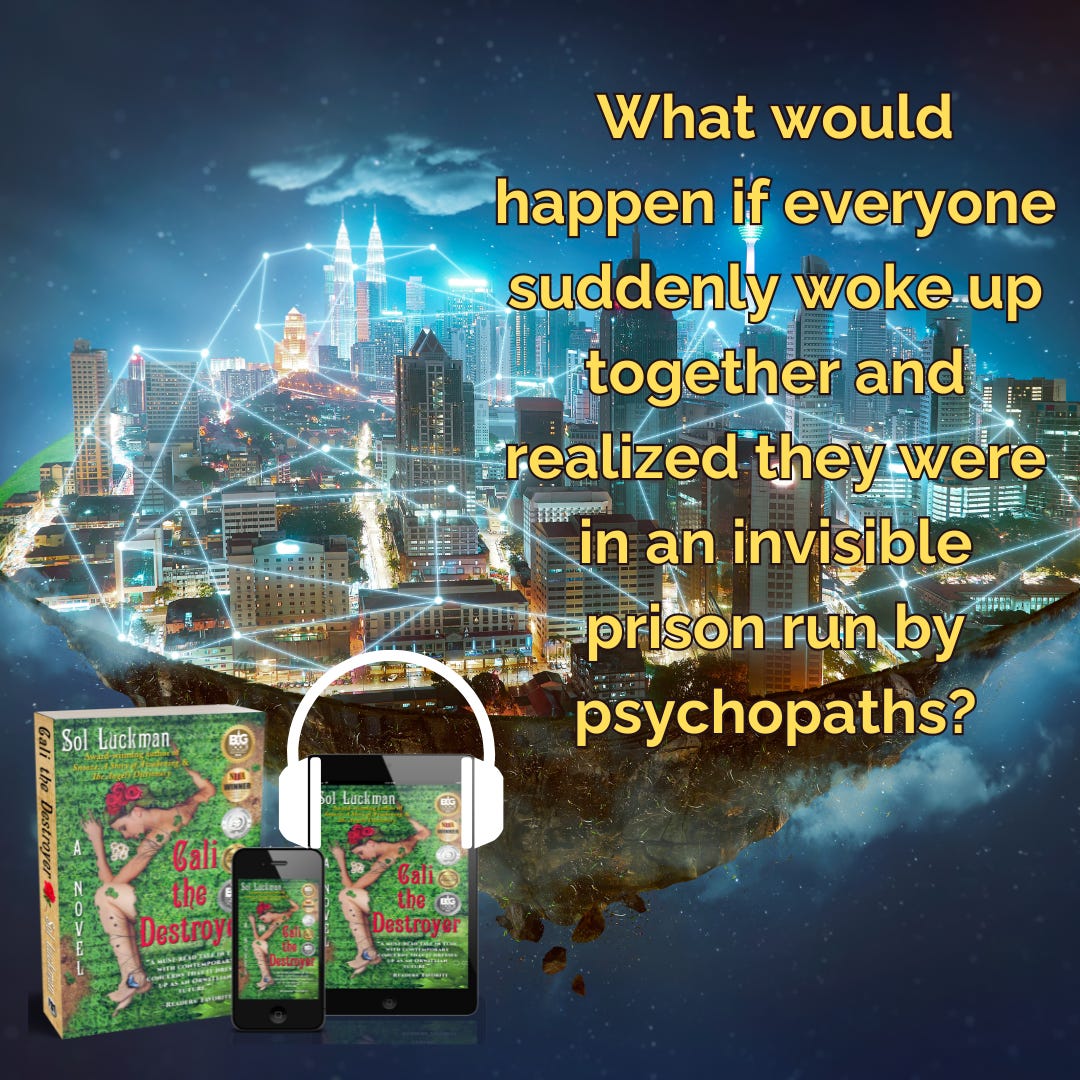



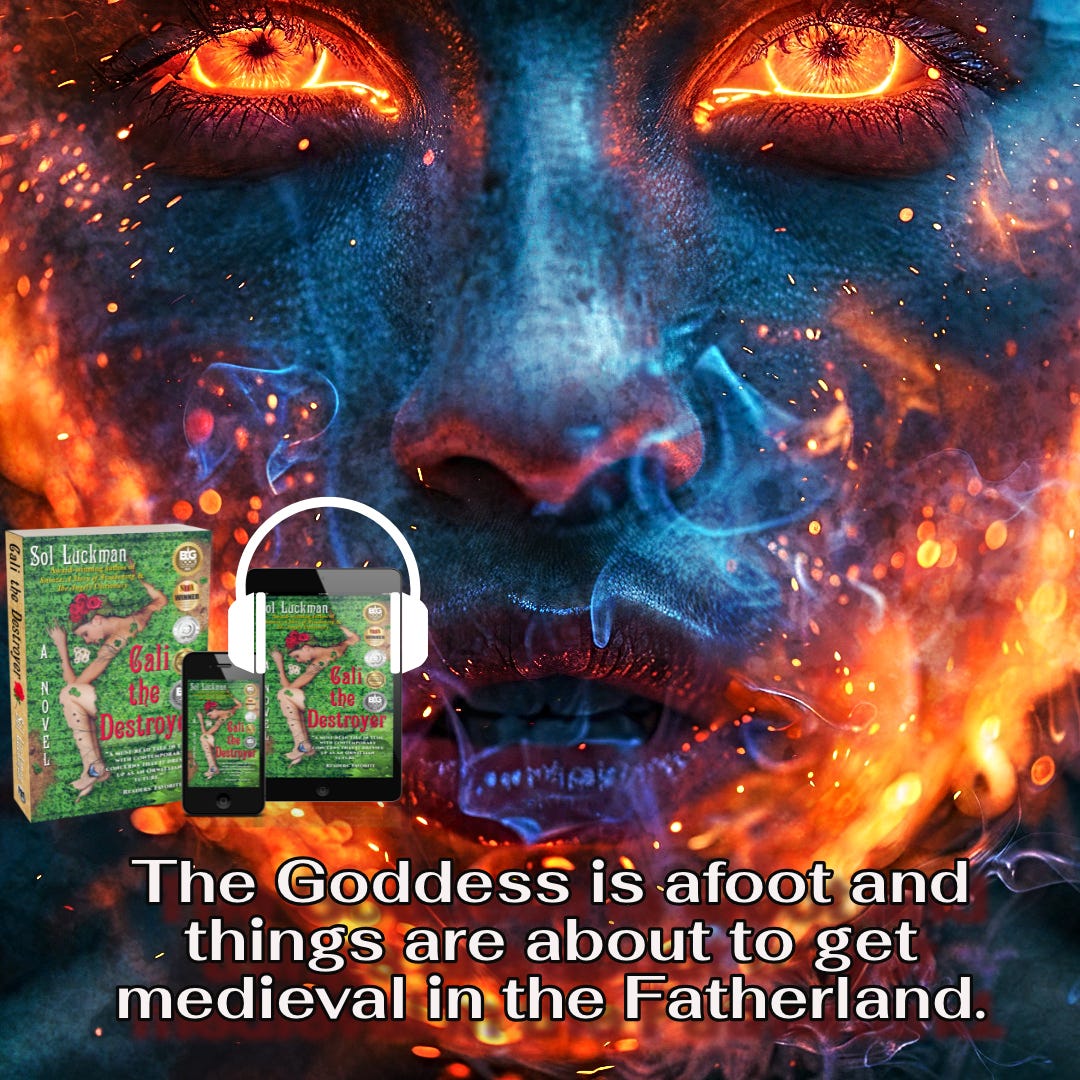
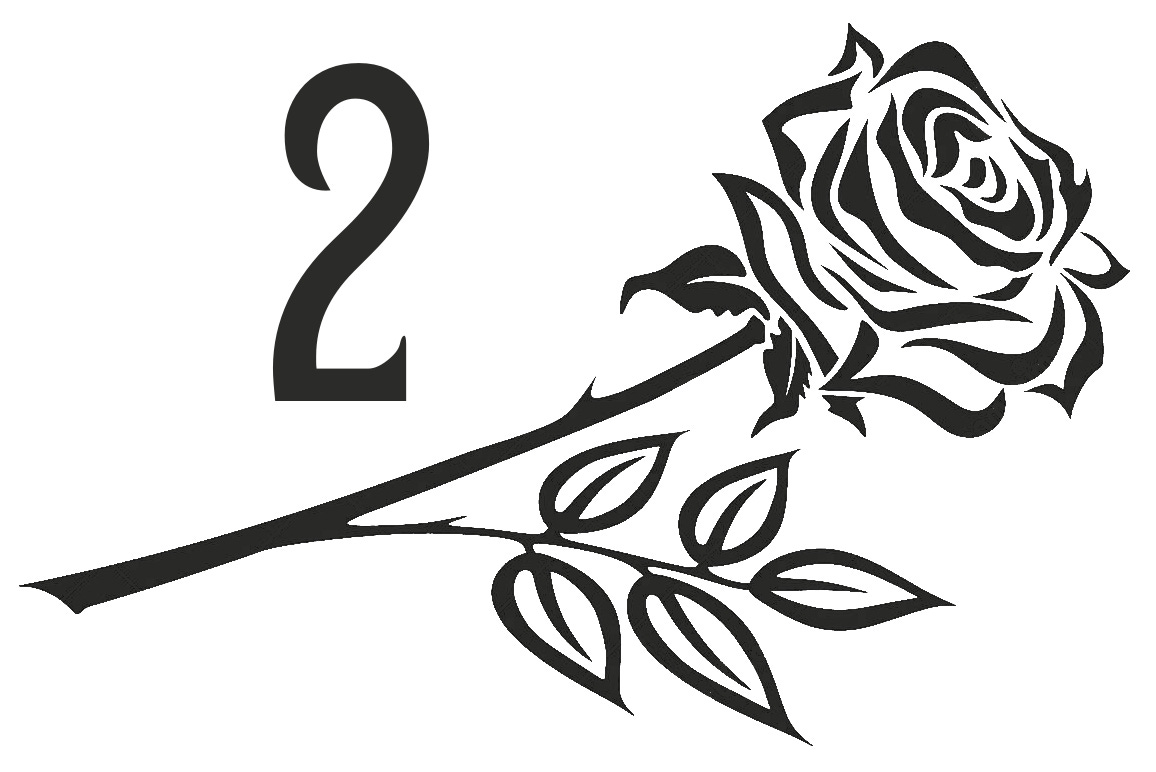

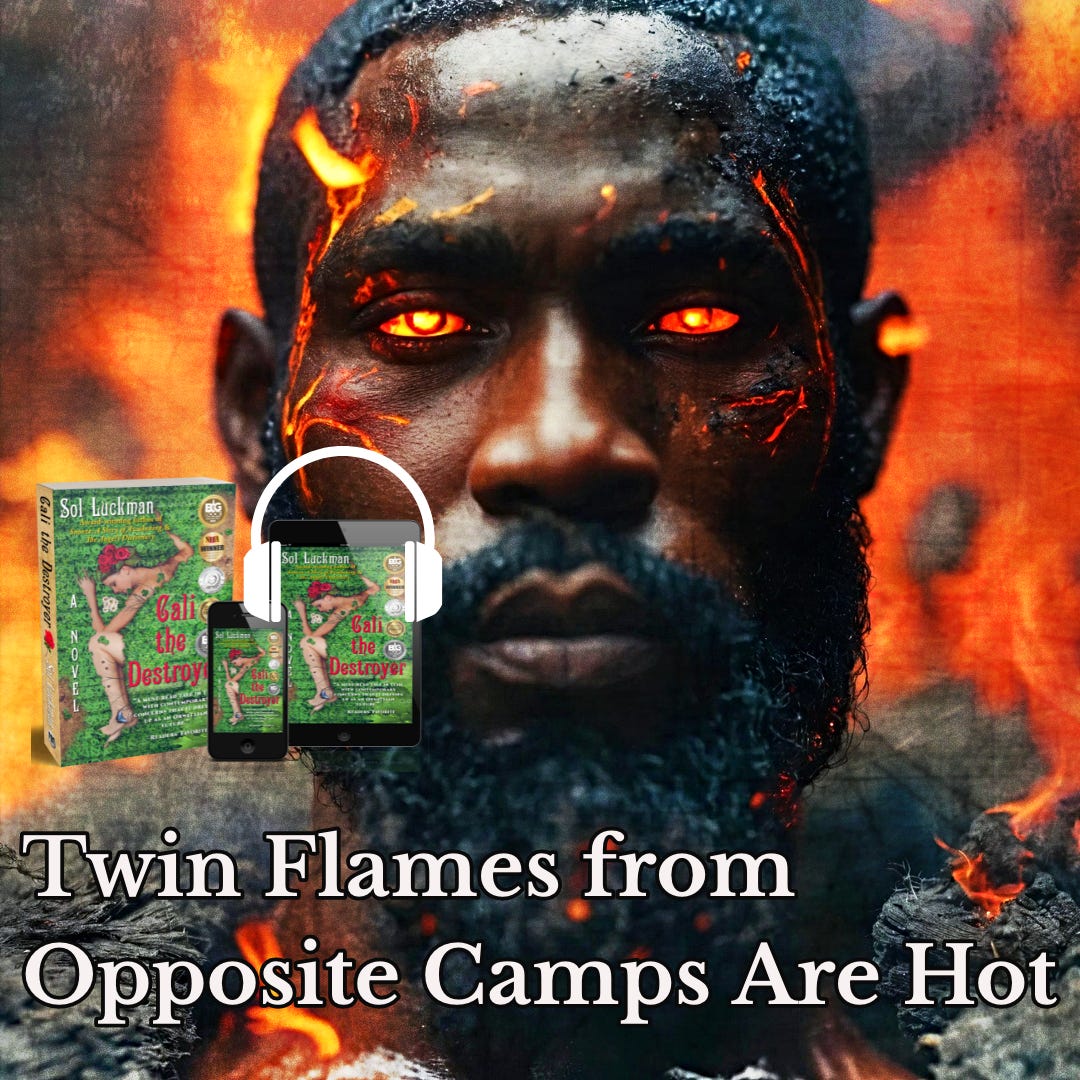
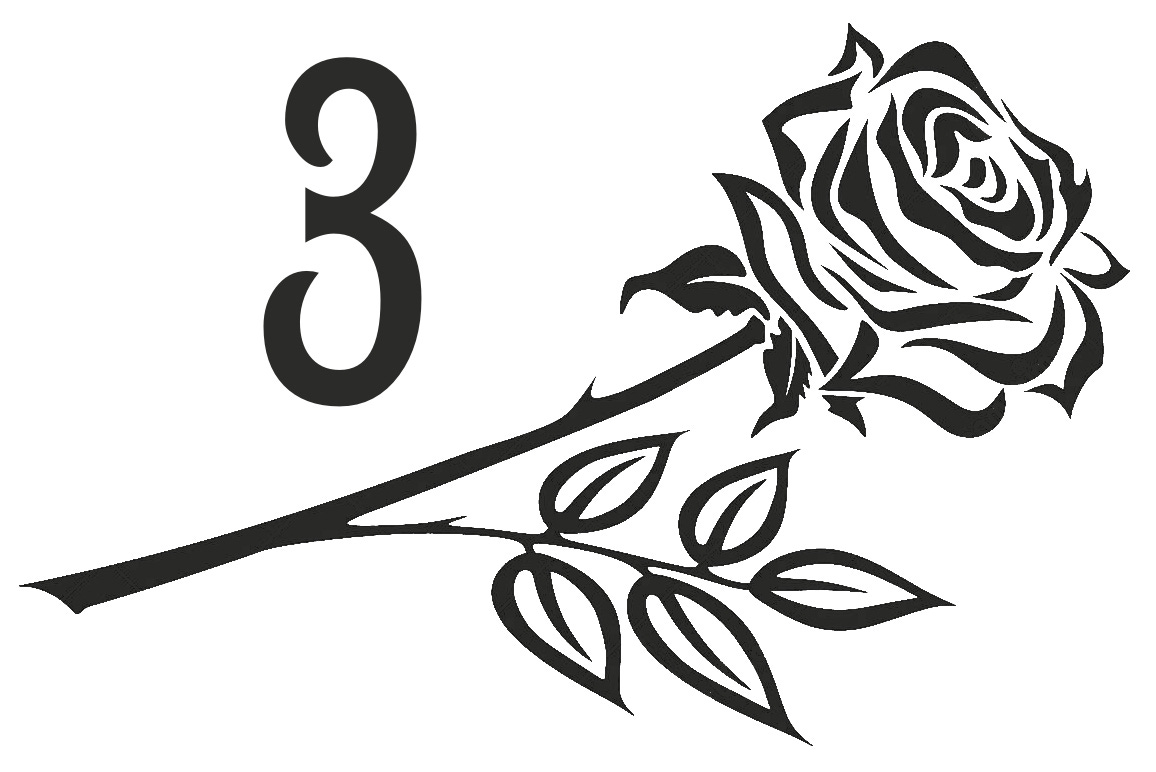

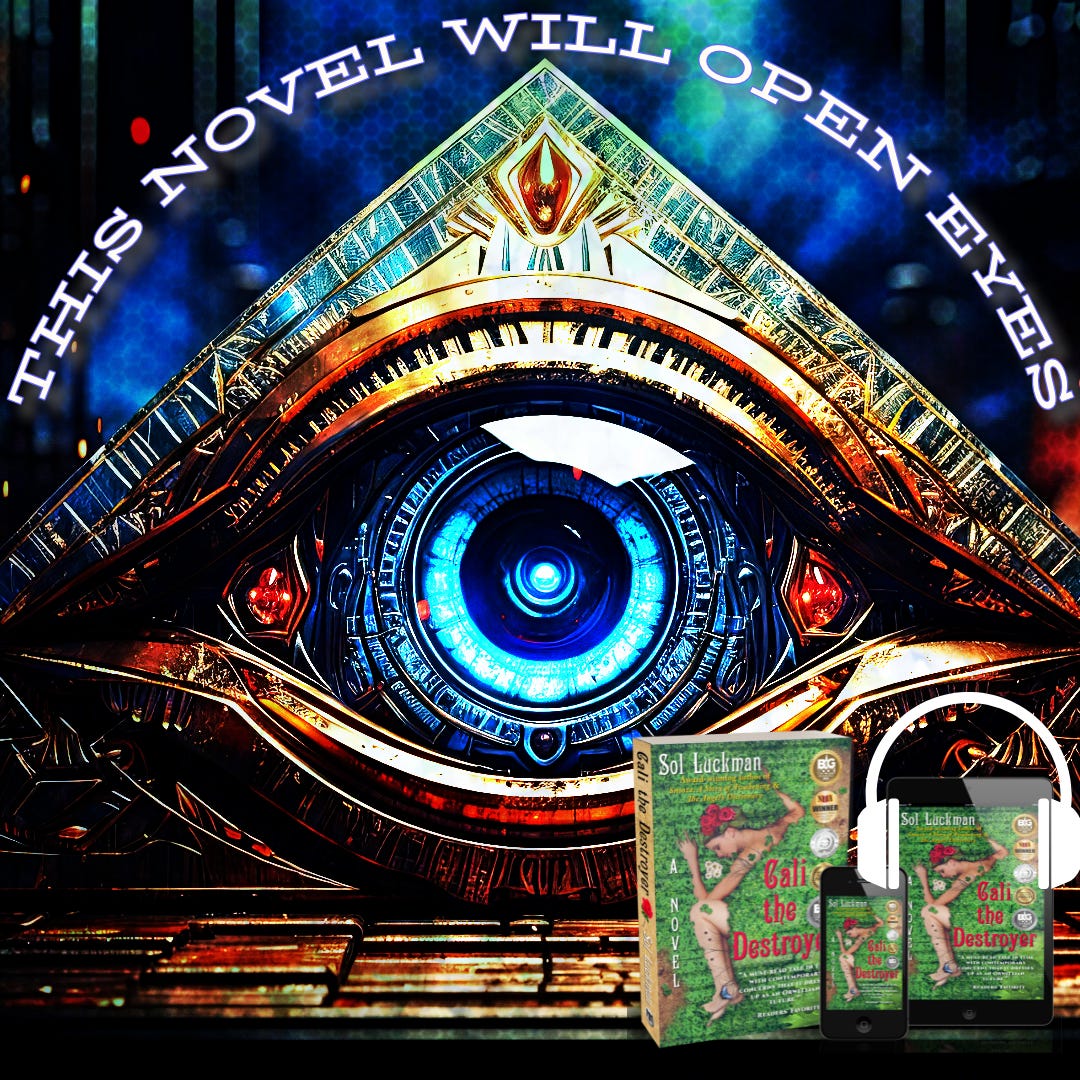
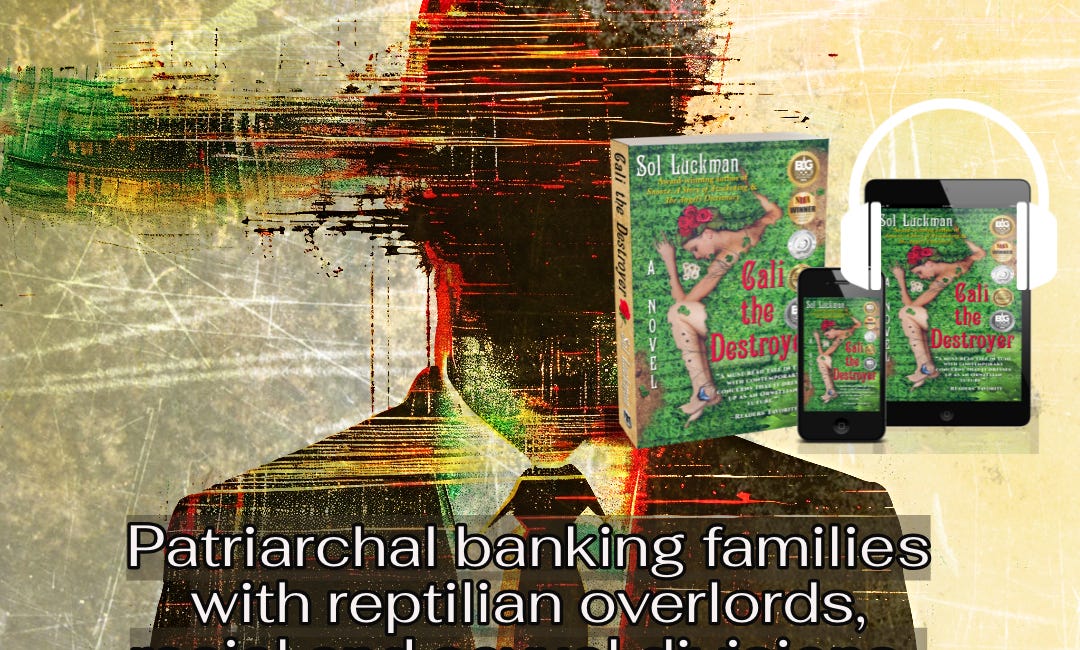
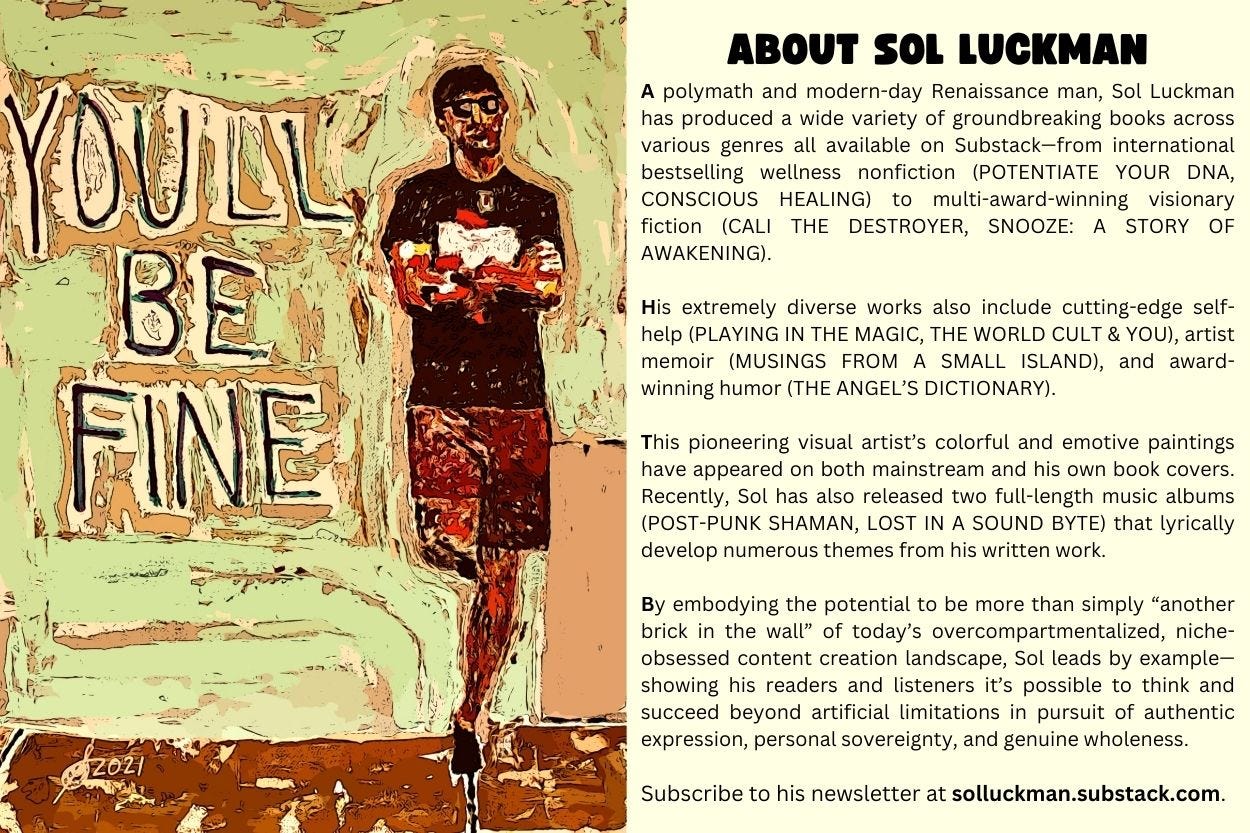












Share this post